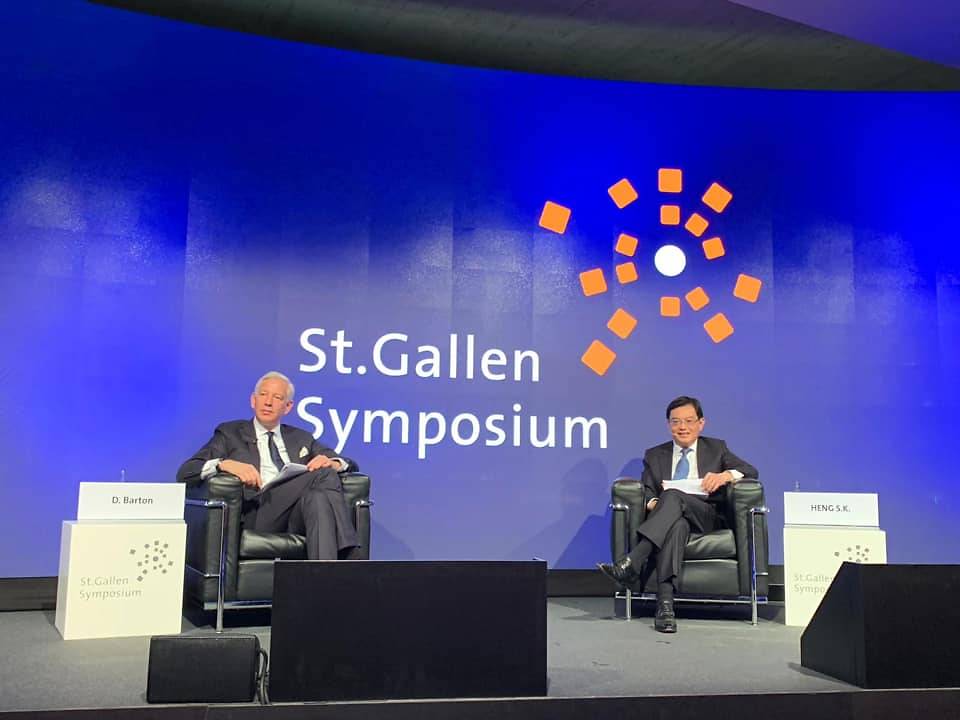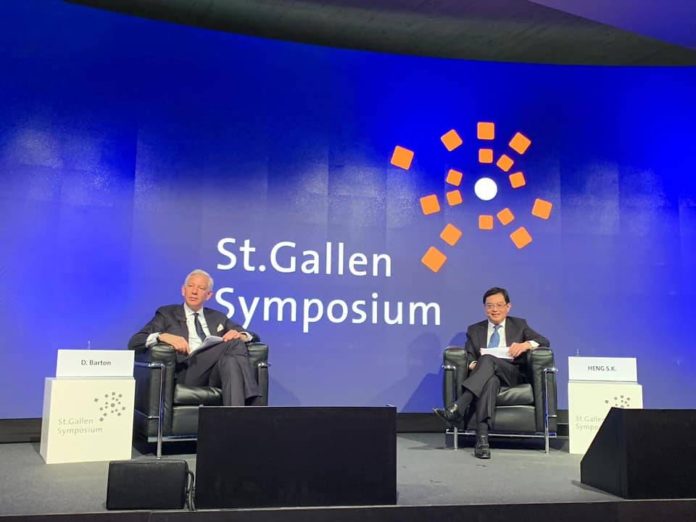ST GALLEN, Switzerland: Deputy Prime Minister (DPM) and Finance Minister Heng Swee Keat said Singapore must continue to “learn how to evolve and improve our systems” and adopt useful policies from other countries.
Speaking at the sidelines of the recent 49th St Gallen Symposium in Switzerland, Mr Heng was interviewed by Swiss newspaper Neue Zürcher Zeitung on Singapore’s housing policy, the country’s governance and democracy, the role of capital in a modern economy and the Government’s role in managing the economy.
When asked about the biggest challenge that Singapore faces, Mr Heng said: “Well, our biggest challenge that we need to address is to build a sense of unity amidst this tremendous changes that are going on around us.”
This can be done with good governance, keeping politics constructive and making hard decisions for the long run. Together with good governance and a “sense of unity among our people”, Singapore can remain strong, the Deputy Prime Minister said.
Mr Heng was on a visit to Switzerland from May 6 to May 10 – his first overseas trip as Deputy Prime Minister – which included visits to several Swiss businesses. The interview was published by the Swiss newspaper on Friday.
READ: Protecting workers, not jobs key to economic transformation – Heng Swee Keat
99-YEAR HDB LEASES “A RATIONAL POLICY”
Mr Heng answered questions on the reasons behind the 99-year leases for Housing and Development Board (HDB) flats.
“It is a rational policy if we believe, if we hope that Singapore will last forever. Don’t forget, the whole of Singapore is 700 over sq km,” the Deputy Prime Minister said.
“If we sell land as freehold and that the moment you own it, you own in perpetuity. What it means is that children who are born in the future will never have any home or be able to buy anything.
“We do have some freehold properties but a very small amount. All the new contracts for housing are sold as 99-year leases, and for industrial development, it is even shorter. It is between 20 to 30 years.”
He said the Government wants to encourage young couples to settle down and have children.
“Our own population is coming down and as our young people are better educated, some have chosen to stay single. It is the same phenomenon that we see in the OECD (Organisation for Economic Co-operation and Development) countries,” Mr Heng said.
“Some of those who are successful say I want to enjoy my life, I don’t want to have family, I don’t want to have kids.
“That is a choice that we have to respect but I hope we can encourage more of our young people to find their life partner and have children.”
SINGAPORE’S DEMOCRACY
When asked about Singapore politics, Mr Heng said it was “not the correct understanding” by saying that the Government has “all the answers”.
“Many of us, myself included, have been on record saying that the Government cannot possibly have all the answers to all of the problems and that is why we have to mobilise our society to resolve many of these issues,” said Mr Heng.
“And beyond just resolving the issue, it is also a sense of ownership that as a citizen, I can do what is right and I choose as a citizen to contribute in different ways.”

Mr Heng Swee Keat wrapped up a five-day trip to Switzerland after speaking at the 49th St Gallen Symposium. It was his first overseas trip as Deputy Prime Minister. (Photo: Facebook/Heng Swee Keat)
When questioned about the “Western idea” that competition “helps to breed the best”, Mr Heng said Singapore has “free and fair elections”.
“In the last election, there were so many parties that contested and as I mentioned at the forum earlier on, in 2011, we lost six seats. We lost a number of key ministers,” said Mr Heng.
“The minister was formerly a Minister for Trade and Industry and was our Foreign Minister. Well-respected around the world, but lost the election.
“The Second Minister for Finance lost the election. A very prominent Member of Parliament who had been in politics for many years, who was slated to be the Speaker of Parliament, lost the election because the whole team lost. Five of them in a group constituency.
“Is it a democracy? It is to me. Did we respect that? Yes, we do.”
READ: PAP working on party manifesto, selecting candidates ahead of next General Election: DPM Heng
READ: ‘Nature of politics’ the biggest ‘unknown’ future challenge for Singapore, says DPM Heng
Added Mr Heng: “The fact that the ruling party has been able to win elections is not because we have been suppressing. The fact is that we have, as I said in my speech earlier on, we have delivered on what we promised, and that we have won the trust and confidence of Singaporeans.
GOVERNMENT’S ROLE IN BUILDING CAPITAL
The Deputy Prime Minister said most Southeast Asian countries came through the global financial crisis better than most people expected because they learnt the lessons of the 1997 to 1998 crisis.
Speaking about the free market approach, Mr Heng said the “market-based approach of allocating capital to its most productive uses remains the best mechanism”.
“But the focus just on the return to capital will not suffice. This is particularly so at a time when technologies are transforming rapidly,” said Mr Heng.
“In that regard, what is important is that even as businesses reinvent themselves and transform, both businesses and governments will have to do more to help our workers to be better prepared for the future.”
Trade unions, such as the National Trade Union Congress (NTUC), have evolved from a “confrontational approach” to a “more collaborative approach”.
“We recognise that more skillful, more productive workers make the company more competitive, and the more competitive, more productive company is able to retain workers better, is able to pay workers better,” said Mr Heng.
“That is a sustainable way of increasing welfare – both the welfare of the workers, as well as the welfare of the owners of capital.”
READ: Close ties between PAP, NTUC will continue into 4G leadership: DPM Heng Swee Keat
When asked if the Singapore model of development is a capitalist model, the Deputy Prime Minister said it was “easy to create misunderstanding” by putting a label on models.
“The idea that the private market can do everything and therefore, create growth, and that free, open competition alone will be sufficient to assure a good outcome is not something I believe in,” Mr Heng said.
“I don’t agree with that. I believe governments around the world do have important roles.”
A government should set up rules to provide certainty for all investors, such as not changing “the rules of the game halfway”.
He added that a government has a very important role in providing critical infrastructures – such as roads, airports and seaports – and to invest in education and basic research.





